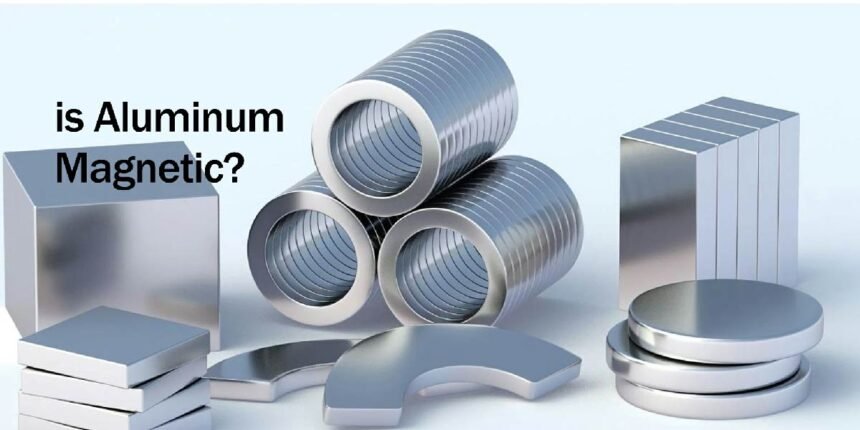When we consider the magnets, we think of such metals as iron and steel. What of aluminum? Most of the population has been asking, Is aluminum magnetic? The short answer is, no, aluminum is not magnetic (at least not in the sense in which we tend to think it is).
In this article, we are going to know what magnetism means, the behavior of aluminum with magnets, and the reason why it falls into its category.
What is the Term Magnetic?
A magnetic material is a material that can be attracted to a magnet, or it may be magnetized. The magnetic behaviors comprise three types:
- Ferromagnetic ferromagnetic strong attraction to magnets (e.g., iron, nickel, cobalt)
- Paramagnetic- Weak attraction to magnetic fields
- Diamagnetic Weak repelling magnetic field
These terminologies explain the behavior of aluminum.
Is Ferromagnetic Aluminum?
No. Aluminum is not ferromagnetic. This means:
- It does not get attracted to the magnets just like iron.
- It fails to remain magnetized.
- An ordinary fridge magnet will not cling to an aluminum material.
- Therefore, aluminum is negligible in being magnetic in real life.
However, magnesium influences Aluminum… How?
Now here comes the interesting bit: contrary to popular belief, aluminum does not behave like a magnet in the conventional sense of the word, but, in any case, it is sensitive to strong magnetic fields. This comes about because it is paramagnetic.
Paramagnetic Behavior:
- Aluminum gets weakly attracted to a much stronger magnetic field when placed in it.
- This is overcome when the magnets are taken away.
- Most people are unable to feel it because the attraction is so small.
Electromagnetism and Aluminum
- When brought close to a magnet, aluminum also exhibits interesting behaviour. This takes place through electromagnetic induction.
- The way it works is the following:
- When aluminum passes through a magnetic field, electric currents (known as eddy currents) are produced.
- The currents establish a counter-magnetic field.
- This makes the aluminum resist motion-this is referred to as magnetic braking.
Example:
This is the method of separating aluminum in the scrap yards. The metal pieces are passed across a magnetic field by using machines. Aluminum does not get attracted by a magnet like iron does, but it reacts to it and can be isolated.
Applications of the Magnetic Property of Aluminum in Real Life:
- Trains and roller coasters have magnetic brakes
- Recycling of metal separation
- Attachments of the MRI machines where non-magnetic metals are required
- Electronic shielding because of the non-magnetic characteristic
- In the case of cookware, no obstruction occurs until it is coated with induction stoves.
Reasons Why Aluminum Is Not Magnetic
- No free electron pairs – Magnetic materials have unpaired electrons that align straight in a magnetic field. The electrons in aluminum are in pairs.
- Crystal structure – Atoms are arranged in such a way in aluminum that the powerful magnetic interaction is not possible.
- Absence of magnetic domains – The materials, such as iron, contain magnetic domains, which orient. None is in aluminum.
- Low magnetic permeability- It does not allow magnetic fields to conduct easily.
Reliable Aluminum supplier ensures to produce and supply Aluminum of optimum quality.
Aluminum vs. Other Metals
Here’s a quick comparison of aluminum with other common metals:
| Metal | Magnetic? | Type of Magnetism |
| Iron | Yes | Ferromagnetic |
| Steel | Yes (if it contains iron) | Ferromagnetic |
| Copper | No | Diamagnetic |
| Aluminum | No | Paramagnetic |
| Nickel | Yes | Ferromagnetic |
| Brass | No | Non-magnetic |
| Stainless Steel | Sometimes | Varies by grade |
As you can see, aluminum is in the same non-magnetic category as copper and brass. This is the reason why producers use Aluminum in Aluminum CNC machining.
Is it possible to make Aluminum magnetic?
Not really. Aluminum does not become magnetic using conventional procedures, unlike steel, which may be magnetized. Nevertheless, in experiments, scientists can produce special alloys or nanostructures that exhibit magnetic properties. Aluminum, however, is non-magnetic in everyday life.
Just how safe is Aluminum in proximity to magnets?
- Yes. Owing to its not possessing a magnetic charge:
- The tools made of aluminum are safe around electronics.
- Aluminum windows do not interfere with magnetic force.
- Aluminum is perfect where magnetism becomes unhealthy and bothersome.
Conclusion
Then, is aluminum a magnetic attractant? The answer is negative, at least in those respects in which we ordinarily regard a force as magnetic. Aluminum is paramagnetic, and this means that it temporarily responds weakly to magnetic fields.
It has several peculiar properties and can therefore be deployed in most areas, including transportation and electronics, where non-magnetic materials are desirable.
By learning the behavior of aluminum towards a magnet, we are in a better position to apply it appropriately in science, industry, as well as in our everyday life.
For More Information Visit Fourmagazine


